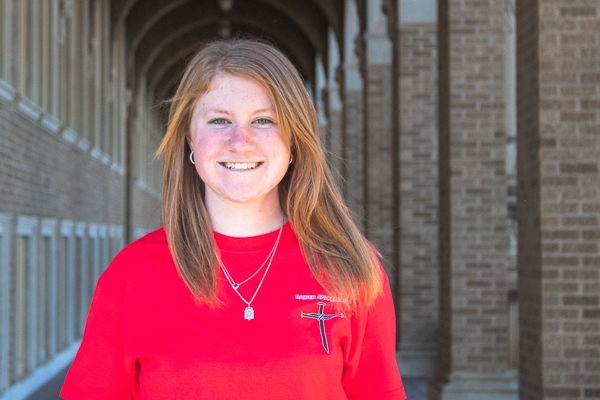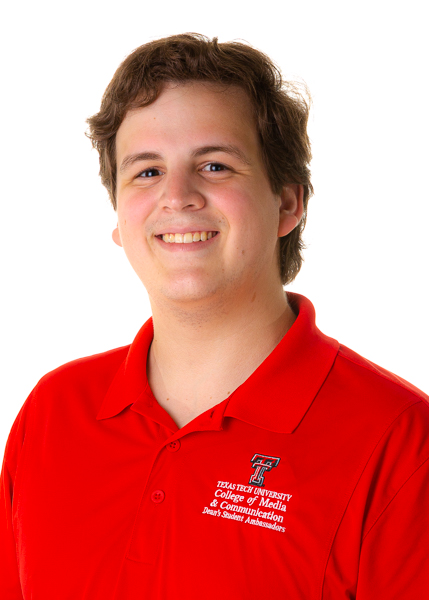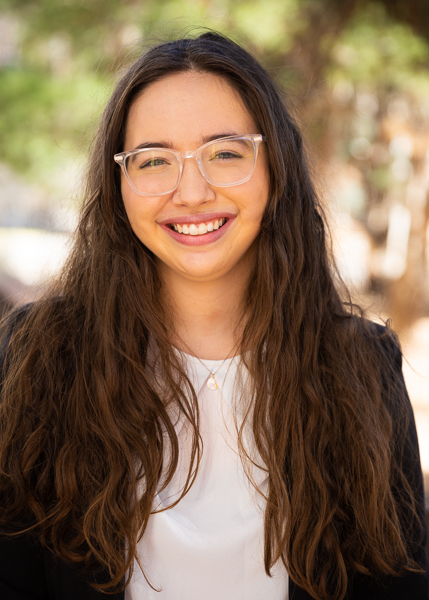During challenging times for immersive learning at Texas Tech University, the College of Media & Communication's commitment to providing its undergraduates a broad variety of valuable experiences is bolstered by a strong undergraduate research program.
Undergraduate researchers assist various college faculty with their research by administering surveys, helping run labs, and even conducting and resenting their own research at some of the largest communication conferences in the nation.
“Carrying out research projects is a hands-on experience just like so many other educational opportunities we give our students,” said Associate Dean for Research & Grants Glenn Cummins, Ph.D. “Some people only think of the very applied aspects of communication, like writing news stories or making advertisements. But the research these students are doing helps answer the important questions, like the strategy behind message creation, or the effects of our communication efforts.”

Michelle Bless, a senior communication studies major from Dallas, recently worked with Narissra Punyanunt-Carter, Ph.D., a professor in the Department of Communication Studies, to create and distribute surveys for several research projects. She presented her research, “Patterns of male and female communication and behavior in: The Bachelor and The Bachelorette,” at the 11th Annual Gender & Sexual Identities Colloquium at TTU.
“When I got recruited to communication studies, I loved absolutely everything I was learning,” Bless said. “I loved every professor I met. I didn't ever expect that I would want to go to grad school. I never expected research would become something so important to me. When you find what you're passionate about, grab on to it and never let it go.”
Bless, who graduates in May, is currently working on presentations for upcoming conferences, and she hopes to get her master's at Texas Tech to continue her research career.

Luis Meade, a senior dual major in economics and public relations from Plano, Texas, works as a research assistant for Jaime Banks, Ph.D. Their paper, “First encounters with social robots: Determining the likeability gap via users' attribution of mental capacities,” will be presented at next year's Society for Personality and Social Psychology virtual conference.
Meade wasn't sure about his professional direction after graduation, but his time as an undergraduate researcher cleared the waters.
“It's really drawn me in,” Meade said. “I've learned to program, and I've learned a lot more about statistics since then. I'm on a career track that is still fairly economics focused, but I am heading more in that research path. I'm going to go to grad school eventually, just not straight after graduation. But I would like to apply what I've learned in Dr. Banks's lab in some sort of economic research or litigation assistance firm.”
Banks, an associate professor in the Department of Advertising & Brand Strategy, believes research provides ample opportunities for anyone seeking to broaden their sphere of knowledge.
"Research is beneficial to all sorts of careers, and critical thinking is necessary for any media and communication career,” Banks said. “There's a lot to be gained for people even if they don't think they want to do research as a career."

Saydie French, a senior public relations and communication studies student from Houston graduates this month. French will also present her work, “The nuts and bolts of race and sex cues: Human stereotypes applied to social robots,” with Dr. Banks at next year's Society for Personality and Social Psychology virtual conference.
French has worked as a research assistant for most of her undergraduate career and notes it has a positive effect on her ability to work on a professional level with experts.
“I'm much bolder about going to talk to my professors or reaching out to them,” French said. “During my freshman year, I think the only reason I went to office hours was because I thought we were going to fail a group project. Now, I go talk to my professors all the time.”
As a transformative learning experience, undergraduate research opportunities are highly encouraged in the College of Media & Communication. When the undergraduate researchers were asked what they learned most from their work, they mentioned consistency, confidence in their studies, and even a greater knowledge of what they want their future to look like.
Associate Dean Cummins considers undergraduate research an enlightening opportunity for any student's professional future, as well as a highlight of the college's academic and preparatory endeavors.
“Getting engaged in research gives our students an experience that really enriches their education,” Cummins said.
“Understanding the research process, developing questions, and then conducting original
research to answer those questions is a skill that helps students regardless of their
major. To have students like these engaged in the research process really speaks to
how important research is to our college's mission.”
